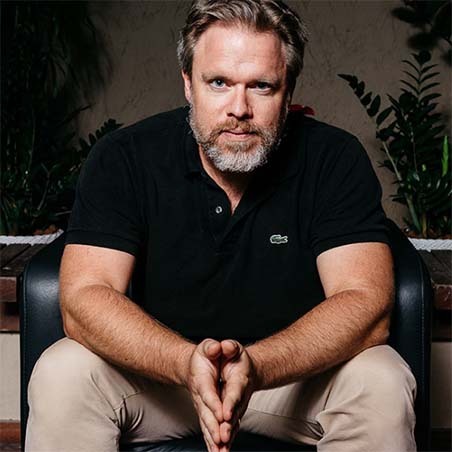Robert Muggah
Co-Founder, Igarapé Institute
Bachelor of Arts (Hons.), Political Science and International Development Studies, 1997
The decisions we take in this decade will shape the trajectory of this planet for the coming thousand years—and that’s both terrifying and empowering to imagine.
In late 2019, Robert Muggah, BA(Hons)’97, and his family moved to New York from their home in Rio de Janeiro. Back in 2010 Robert co-founded the Igarapé Institute in Brazil, a ‘think-and-do tank’ which works primarily on citizen, digital and climate security across the Americas and Africa.
Just a few months into the sabbatical, Robert learned of the encroaching global threat of COVID-19. “I’d been writing about this for years—the threat of pandemics to cities and their most vulnerable populations,” Robert explains. Aware that New York could very well become the epicentre of the world for COVID-19, he relocated his family to Ottawa in March 2020.
Since returning to Canada, he has been working tirelessly on a variety of projects related to digital transformation, the green economy, and the COVID-19 recovery, and how these issues will shape the future of our planet. “My work is focusing on the ways mega-threats – including pandemics – are accelerating changes in our societies. Rather than just write about these issues, I’m also trying to take to action.”
One of his initiatives involves designing digital tools and visualization platforms to help large cities like Amsterdam, Bristol, Chicago, Los Angeles and Ottawa respond to viruses and increase their resilience—both online and off.
His new book, co-authored with Oxford Professor Ian Goldin, is called Terra Incognita: 100 Maps to Survive the Next 100 Years. Published in several languages, it summarises decades of research for a global audience, outlining ways to make tangible progress towards more inclusive globalization, including on issues related to climate change.
“The book is essentially a repository of everything I’ve learned over the past two decades,” he says. “The big idea is to use powerful maps to help give signposts for dealing with threats. The big message is that we’re facing a host of systemic risks which are layered and cumulative … More than ever, we need to mobilise a much more determined and collective effort to address them. International cooperation is really the key to our survival; we need better globalization, not less.”
Now that he has returned to Canada, Robert is closer to his technology company, SecDev, which works on another global challenge—digitisation. “Our focus is on supporting governments, business and non-profits undergo digital transformation.” he explains. The SecDev team is also working in the context of COVID-19—they set up a voluntary cyber security defense force in Canada to provide free and subsidised services to public health institutions.
And it didn’t take long for Robert to reacquaint himself with Canadian current affairs. He recently accepted an invitation to help organize the Rt. Hon. Robert L. Stanfield lectures through Dalhousie University. Chaired by former Prime Minister the Rt. Hon. Joe Clark and former Deputy Prime Minister Anne McLellan the seminar series is focused on a single question, “What is the future of democracy in a fragmented world?”
He is also working on a new environmental eco-thriller about crime in the Amazon, which he and his co-author Misha Glenny are developing for Netflix.
And homeschooling his daughter. “Like everybody else, I’m juggling home and work with pretty limited success!” he smiles.
After getting his undergrad, which included the Foundation Year Program (FYP) at King’s, Robert went on to get his MPhil from Sussex University and a DPhil from Oxford University.
With no shortage of projects to work on and global problems to solve, Robert still credits the Foundation Year Program (FYP) at King’s for building his intellectual and ethical foundation for debate and critical reflection, which has informed much of his work.
“What I loved most about FYP was this idea of spending a year reading, maybe 70 or more books. We then had to defend our ideas orally—and on paper—on a regular basis. It emphasized an approach to critical inquiry that is less common in the North American education system these days,” Robert says. “We are in the midst of a truly monumental period of change, geopolitically, environmentally, technologically. We need to be steeped in our many histories and the humanities to make wiser decisions for future generations.”
“We have an opportunity to take action, to trigger change, and that’s pretty remarkable.” Robert concludes. “The decisions we take in this decade will shape the trajectory of this planet for the coming thousand years—and that’s both terrifying and empowering to imagine. We’re alive to be witness —to participate—in this history-making moment.”
Updated: January 2021
 Connect with Robert Muggah
Connect with Robert Muggah